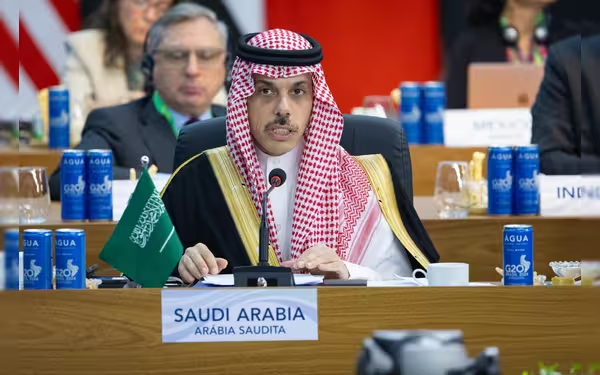Monday, December 23, 2024 10:11 AM
Saudi Arabia's Foreign Minister Advocates Balanced Energy Transition at G20
- Prince Faisal emphasizes global energy security challenges.
- Saudi Arabia aims for 50% renewable energy by 2030.
- International cooperation is vital for equitable energy transitions.
 Image Credits: arabnewspk
Image Credits: arabnewspkSaudi Arabia's Foreign Minister urges a balanced energy transition at G20 Summit, highlighting global energy security and sustainability.
At the recent G20 Summit held in Rio de Janeiro, Saudi Arabia's foreign minister, Prince Faisal, emphasized the critical need for a balanced and inclusive approach to energy transition. This discussion is particularly relevant as countries around the world grapple with the dual challenges of ensuring energy security while also pursuing sustainable development. The session, titled "Sustainable Development and Energy Transition," brought together leaders from various nations to address these pressing issues.
During his address, Prince Faisal pointed out that energy security is not just a national concern but a global challenge that can hinder development and efforts to eradicate poverty. He stressed the importance of creating energy plans that take into account the unique circumstances and developmental needs of each country. This perspective is vital, as a one-size-fits-all approach may not be effective in addressing the diverse energy needs of different nations.
To facilitate an effective energy transition, Prince Faisal outlined three essential pillars: ensuring energy security, maintaining access to affordable energy, and achieving environmental sustainability. He noted that transitioning to sustainable energy sources requires substantial investment and time. It is crucial to maintain market stability while ensuring that the transition is fair and inclusive for all stakeholders involved.
Technological innovation plays a significant role in this transition, according to the Saudi foreign minister. He highlighted that Saudi Arabia's investments in innovative technologies have led to one of the lowest emissions intensity rates in oil and gas operations globally. Furthermore, the Kingdom is making strides in its renewable energy goals, aiming for 50 percent of its electricity generation to come from renewable sources by 2030.
In addition to renewable energy, Prince Faisal mentioned that Saudi Arabia is expanding its clean hydrogen production and implementing a circular carbon economy framework. This framework aims to repurpose emissions into valuable products, showcasing the Kingdom's commitment to sustainability.
Moreover, the prince reiterated Saudi Arabia's dedication to global sustainability through its flagship initiatives, the Saudi Green and Middle East Green programs. These initiatives are specifically designed to align with the country's development needs while contributing to global environmental goals. He called for enhanced international cooperation to ensure that energy transitions are equitable, inclusive, and supportive of global development objectives.
As the G20 Summit progresses, Prince Faisal expressed gratitude for Brazil's leadership in 2024 and extended best wishes to South Africa as it prepares to take on the presidency in 2025. This collaborative spirit among nations is essential as the world navigates the complexities of energy transition and sustainability.
The discussions at the G20 Summit highlight the urgent need for a balanced approach to energy transition that considers the unique circumstances of each country. As nations work towards sustainable development, it is imperative to foster international cooperation and innovation. By doing so, we can ensure a brighter, more sustainable future for generations to come.













